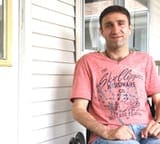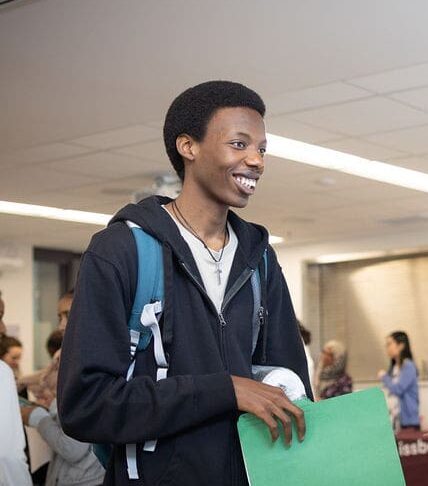About eight years ago, Mustafa Hasan was stuck in Baghdad traffic when he heard an explosion. A car bomb had gone off somewhere behind him and a swarm of people came running past his car to get away from the burning vehicle. Before he had time to figure out what to do, another car exploded, this one fewer than 10 cars behind him. By now, his friend, the driver, had fled, leaving him sitting trapped, alone and confused in the passenger seat. He couldn’t move, and he was dizzy and hurt from where his head had smashed into the windshield after the second blast.
A police officer appeared and yelled at him to get out of the car, but he was stuck. The officer raised his gun, and yelled again, telling the young man to put his hands above his head. Hasan tried to explain that he needed help, but the officer didn’t hear him. In vain, Hasan tried to raise his weak arms, but they dropped back into his lap. The officer fired and Hasan ducked. Crouched down and afraid for his life, he vowed he would leave Iraq as soon as he could if somehow he could get out of this mess.
Just a couple of years before, in 2003, the 21-year-old Hasan had been adjusting the antenna on the roof of his family home in al Karada, a suburb of Baghdad, when an American missile struck a police station a block away. The shock wave knocked him to the ground and broke his neck. From that day, he was paralyzed from the neck down.
Born in Iraq in 1981, Hasan experienced his share of tragedy early in life – his father was killed during the Iran-Iraq war when he was 11 months old, and his older sister died in an accident when he was 15 – but his life had otherwise been good, he says.
He loved swimming and playing chess, and he looked forward to a bright future. After becoming paralyzed, however, he lost all hope.
“After my accident, all my dreams collapsed and I couldn’t do anything,” he says. “I felt that I had become less than zero, . all my dreams become just to walk again.”
After he woke up from surgery and found he could not move his arms or legs, Hasan realized he was like an infant again – completely dependent on his family.
“I wanted to die,” he says. “I didn’t want to be in a wheelchair at all.”
After several failed attempts to take his own life, he realized that having been saved by family members who would not let him give up was reason enough to go on living.
“So I left the country,” he says. “It’s hard to leave, but you have to think, if I (do) not leave, maybe I will get (into) another accident. Maybe I will lose my hand or my leg. That’s normal there. Everyday explosions, so many checkpoints, . you cannot have a normal life.”




